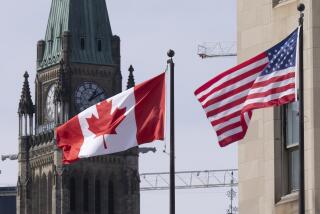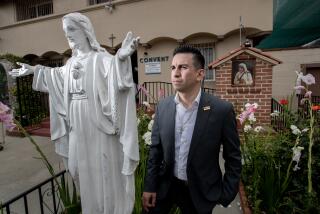Catholics, gays and a parallel universe called Canada
I sometimes think of Canada as one of those science-fiction parallel universes -- a world strikingly similar to but slightly different from our own. The differences can be illuminating.
In Ontario a controversy has been raging, as they say, involving legislation that would require schools to sponsor Gay-Straight Alliances, the anti-bullying clubs that some social conservatives see as Trojan horses for the “gay agenda.” (They’re right, if by gay agenda they mean recognition that gay and lesbian students exist and should feel good about themselves and their sexuality.)
The twist is that Roman Catholic schools in Ontario receive government funding.
The archbishop of Toronto, Cardinal Thomas Collins, had complained that GSAs include an agenda that does not comport with Catholic teaching. What is that teaching? In a document censuring a book on sexuality by an American nun-theologian, the Vatican recently described it as follows: Homosexual acts are “intrinsically disordered [and] contrary to the natural law.”
Nevertheless, after the bill was approved, Collins issued a statement recognizing that it “is now the law” and that Catholic schools “will seek, as we have always done, in a way that is in accord with our faith, to foster safe and welcoming school communities.” The Ontario Catholic School Trustees Assn. said it had no intention of challenging the provision in court.
At a time when U.S. Catholic bishops are crying foul -- or crying wolf? -- about intolerable intrusion on their religious liberty in the form of “Obamacare” regulations, it’s interesting to speculate how they would react to a law like Ontario’s GSA requirement.
This is very much a thought experiment, for a lot of reasons. The U.S. Supreme Court in 1971 struck down state laws providing direct aid to parochial schools (though more recently the court has approved voucher programs in which state funds are provided to the parents of kids in private schools). Canada does not have a 1st Amendment (though its Charter of Rights protects “freedom of conscience and religion”). Finally, well, Canadians are less confrontational than Americans.
But let’s proceed anyway. Suppose our Supreme Court allowed direct aid to religious schools and a state or Congress approved it, but with an Ontario-style GSA requirement. Would this country’s Catholic bishops turn down the money? Or would they argue that they should receive the money but be permitted to opt out of sponsoring GSAs?
My guess is the latter. Consider the bishops’ reaction to the Obama administration’s decision not to extend a contract with a Catholic agency to assist victims of human trafficking. The administration’s reason for not renewing the contract was its fear that the Migration and Refugee Services department of the bishops’ conference wouldn’t refer victims to healthcare providers offering a “full range” of OB/GYN services, including abortion.
An official of the bishops’ conference proposed that Congress pass legislation making it clear that antiabortion agencies would be eligible for such contracts. Likewise, the church could argue as a matter of policy or 1st Amendment law that it should be able to receive government funds for its schools and ignore a mandate to offer services allegedly accepting of homosexuality.
Canada and the U.S. have much in common, but I can’t imagine this country’s assertive Catholic hierarchy humbly acknowledging that an unwelcome enactment “is the law.”
ALSO:
More to Read
A cure for the common opinion
Get thought-provoking perspectives with our weekly newsletter.
You may occasionally receive promotional content from the Los Angeles Times.











